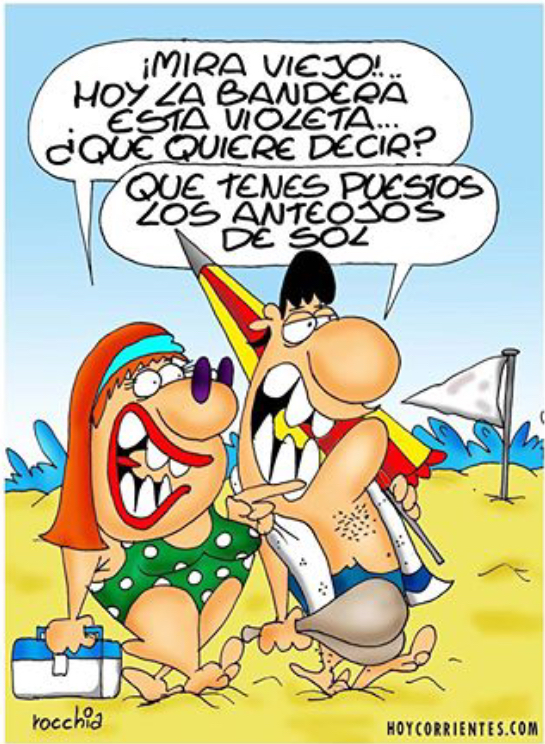Sarah saw seven sharks while she was swimming.
How many S are in this sentence?
Answer: One, the capital letter at the beginning of the sentence.
Sarah saw seven sharks while she was swimming.
How many S are in this sentence?
Answer: One, the capital letter at the beginning of the sentence.
There are several riddles going viral on the Web lately. Here I’d like to suggest some versions translated into Spanish and English from Italian, even though they may be different from those found on the Net. I’ve decided to post them here too not only to entertain you, but because in some cases their answer is not the same in all languages…
Here’s the first one…
A pregnant woman wakes up and leaves her room.
She goes to the fridge and opens a can of tuna,
a soda, a yogurt and a biscuit.
What did she open first?
Answer: Her eyes.

– Look, bro!
Today the flag is purple…
What does it mean?
– That you’re wearing
sunglasses.
Contrary to what one might think, Spanish is not an easy language to learn. Even for an Italian person it can be difficult, although Italian and Spanish are very similar. In addition, we must bear in mind that Castilian Spanish is the generally studied variant. There are actually many more variants worldwide. Among them there are considerable differences mainly in vocabulary, but also in morphosyntax in some cases.
Let’s take as an example this Fernando Rocchia’s cartoon that I’ve already translated into Italian and published on my Instagram account (@zanessis_traduzioni). In Standard Spanish “viejo” means “old”. However, by travelling to different Latin American countries, different meanings of the same word are discovered. So in Argentina and Peru it is used to refer to dad affectionately, whereas in Mexico it means “bro”, as an informal meaning of “friend”.
In morphosyntactical terms, too, we are able to notice a big difference. Rocchia, an Argentinian author, writes “tenés puestos”. “Tenés” is the second person singular present indicative form of the verb “tener”, but only in Latin America since in Castilian Spanish it is “tienes”. Therefore, the ending -és is used in the second person singular present indicative form of all verbs, but only in the Latin American variants of Spanish. Similarly, the Castilian Spanish “tú” is replaced with “vos” throughout Latin America.
So you see that Spanish variants of the American continent would require, on their own, a very thorough study…

– Come on, Apostolis,
tell me what sex is!
– I’ve already told you that when you pronounce the S correctly,
I’ll tell you what sex is!
– Why are you hung up on the S?
There are so many other letters!…
Well, I’ll pronounce
an other letter correctly
and you’ll tell me what sex is!… Okay?…
– Fuck!
– You either have
a tremendous instinct
or you’re making fun of us all!
The Greek cartoonist Arkàs has created a series whose protagonist is a kid having difficulties in pronouncing the S. Right here a little problem arises: in the original version the S is replaced with the Greek letter Θ, a letter that doesn’t exist in the English alphabet. However, we could easily replace the R with the L, a fact that English people are used to attributing to Chinese speakers. In this way substitution would take place: if an element gets lost in the translation process, it can be found elsewhere.
Far more tricky is the translation of the word highlighted in bold. This is the key word that triggers the reader’s laughter. “Γάμα” is the name of the Greek letter Γ (gamma), but it also means “fuck”. If we decided to include the latter meaning, the allusion to the Greek letter and consequently the correspondence to the alphabet would get lost. Instead, if we decided to put any other letter, the damage would be much bigger, since the punchline and the joke’s sense itself would be completely removed. Hence, this is a case where translators are at a crossroads, as they have to choose which of the two pieces of information to convey, even though the laughter’s trigger effect is compromised anyway.
Humour is one of translation’s most complex fields. Think about puns or culture-bound elements (i.e. specific to a language and a culture). Both of them are very difficult to convey to another language. For this reason there are different strategies to translate them, depending on each case.
In order to show these difficulties, I have an account on Instagram (@zanessis_traduzioni) where I publish my Italian translated version of different jokes. However, there are jokes that cannot be translated because in the transposition into English some important elements get lost, therefore cancelling the comic effect. So in this area I want to illustrate some of the cases in which this happens in order to better understand where translation difficulties may arise.